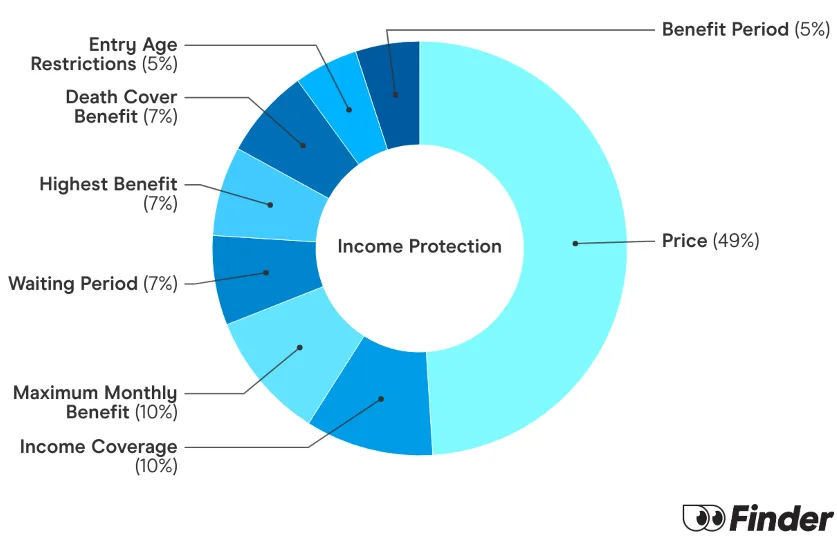Key takeaways
- Finder analysed 12 insurers and found 6 had a maximum entry age of 60. Most other brands cut off at either 55 or 59. Aspect Income Protection will cover you up to the age of 65.
- Income protection insurers usually pay benefits for up to 2 years, 5 years or until the age of 65.
- For those over 60, choosing a shorter benefit period is one way to keep costs low.
Compare income protection for over 60s
Compare other products
We currently don't have that product, but here are others to consider:
How we picked theseFinder Score - Income Protection
Income Protection is a little complicated and a lot overwhelming. That's why we made the Finder Score, to make it easier to compare Life Insurance products against each other. Our experts analysed over 12 products and gave each one a score rank out of 10.
But a higher score doesn't always mean a product is better for you. Your situation is unique, so your policy choice will be too. Don't think of Finder Score as the final word, but as a good place to start your life insurance comparison.
Australian brands who offer income protection for 60s and over
| Provider | Maximum age |
|---|---|
| Aspect |
|
| Zurich |
|
| NobleOak |
|
| TAL |
|
| AAMI |
|
| RAC |
|
| Real |
|
| HCF |
|
| Insuranceline |
|
| Suncorp |
|
*This table was correct as of on 14 April 2025. Keep in mind that restrictions may apply. For example, some occupations won't be covered after a certain age.
If you're having trouble finding advanced age income protection insurance it may be worth consulting an insurance broker to help with your situation.
What's the benefit of having income cover in your 60s?
- Cover against risks. Life today is full of uncertainties; income protection helps you keep up with your expenses if an injury or illness puts you out of work in the short term e.g. 6 months.
- Tax concessions. Plans may be tax deductible in some circumstances. If you buy a direct income protection insurance policy, then you could get some money back on your annual tax return.
- Helps with ongoing bills, including the mortgage. Insurance also acts as a tool to cover mortgages and loans taken by the policyholders so that, in case of any unforeseen event, the burden of repayment does not fall on family members.
Finder survey: What percentage of Australians were prompted to take out income protection insurance due to retirement?
| Response | |
|---|---|
| Retirement | 8.8% |
Can my age limit be extended if I bought my policy before 64?
Some policies will let you extend the age limit, but may impose additional conditions after a certain age. Other policies will guarantee renewability up to a certain age limit. For example, Suncorp lets you retain cover until age 75. However, you need to take out a policy before age 60.
Others, such as AIA income protection policies, offer a "2-year benefit period to age 70" option. This can insure you up to age 69, but includes the following conditions:
- Policy owners must be between 61 and 65 years of age at their next birthday to be eligible for this benefit.
- Maximum benefit payment of $20,000 applies.
- Only available with a stepped premium structure. Premiums are not available as level or optimum.
- Other benefits received under government age pension will be offset against benefit payable.
- Expiry date is the policy anniversary prior to the policyholders 70th birthday. Therefore, the age limit is 69 despite the name of the option. The cover and any benefit payments being made will be at this date.
What to look for when comparing income protection policies if you're over 60
- Benefit period: Income protection pays you a benefit up to 75% of your gross monthly income. The length of cover may vary between each provider but there are income protection policies which extend cover to age 65. So even if you are 60 or older, there is still something for you.
- Premium waiver: A waiver feature lets you waive the premiums when you are receiving the pay-out, and retain the police without payment of premiums.
- Guaranteed insurability: Also referred to as "guaranteed renewability", this is an important feature. It means the insurer cannot decide to decline your policy renewal, and that you'll retain cover until the expiry age as long as you don't let it lapse. Without this feature an insurer may decide not to renew your cover after a certain age, when the risks, and therefore the chance of paying out, is higher. Moreover, a non-cancellable contract may also let you renew your cover even after making a claim. Policies with this option may cost more than those without, but the security is generally well worth it.
- Waiting period: Another thing that you should be looking for is the length of the waiting period. How long are you willing to wait before you can cash in your claim? Income protection has flexible waiting periods you can choose from between 14 days to 24 months. Some policies offer a no waiting period feature, however, policies with no or short waiting periods typically have higher premiums than those with longer waiting periods.
- Rehabilitation expenses benefit: A feature that benefits anyone over 60, this benefit pays you an additional amount to help with rehabilitation costs. Other income protection policies also have added medical and surgical expenses benefits. This offer will vary from provider to provider. The best way to find out if these add-ons are available is to compare various income protection policies from different insurers.
Speak to an insurance specialist to help you find personalised cover
Frequently asked questions
More guides on Finder
-
HCF Income Protect Insurance
Wondering if HCF Income Protection Insurance is right for you? We break down what’s covered, what’s not and whether it offers good value.
-
TAL Income Protection Insurance review
Learn the built-in benefits of TAL income protection to understand how it could work for you. Compare features and get a quote today.
-
Sick leave Australia: What you’re entitled to and when
Find out why income protection is an important tool to combine with your entitled sick leave.
-
Cost of income protection in Australia
Income protection costs can range from around $50 to $160+.
-
Sole trader income protection insurance
Income protection for sole traders provides financial support, via a monthly payment, if you’re unable to work due to illness or injury.
-
Income Protection Insurance vs Mortgage Protection
Does income protection provide the same thing as mortgage protection? Read on and compare.
-
Suncorp Income Protection Insurance Review
Receive income cover for illness or injury with Suncorp Income Protection.
-
Income protection insurance calculator
Find out how much your income protection insurance policy will pay out in the event of a claim. Receive quotes for income protection and apply securely.
-
NobleOak Income Protection Insurance review
NobleOak has been offering personal insurance solutions direct to Australians for over 137 years. Discover the benefits and features available on the NobleOak Income Protection policy and make a secure enquiry for cover.
-
Best income protection, Australia
Looking for the best income protection insurance but not exactly sure where to start? Compare the Finder Awards 2025 insurance winners.


